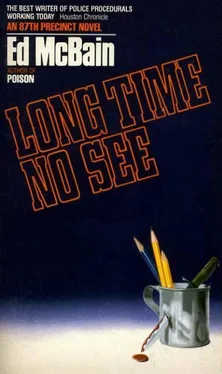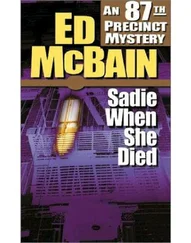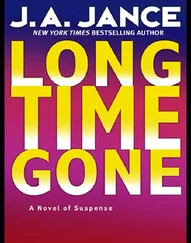“Sergeant downstairs told me to come up here,” the corporal said. “I’m looking for somebody named Capella.”
“Carella, that’s me.”
“This is from Captain McCormick,” the corporal said, and handed Carella a maniia envelope printed in the left-hand comer with the words U.S. Army, Criminal Investigations Division.
“You’re here early,” Carella said.
“Actually, we got the packet yesterday, but there was nobody in the office. Mail room clocked it in at 4:07 p.m. Guys in St. Louis must’ve put it on a plane late Saturday night. That’s pretty good time, don’t you think?”
“That’s very good,” Carella said. “Thanks a lot.”
“Don’t mention it,” the corporal said. “How do I get to Reuter Street? I’ve got to make a pickup on Reuter Street, the recruiting office there.”
“That’s all the way downtown,” Carella said. “Are you driving?”
“Yeah.”
“When you come out of the station house, make a right, and then another right at the next comer. That’s a one-way street heading north, it’ll take you straight to the River Highway. You want the westbound entrance. Take the highway downtown till you see the sign for Reuter.”
“Thanks,” the corporal said.
“Thank you,” Carella said, and gestured with the manila envelope.
“Don’t mention it,” the corporal said again, and did a smart about-face and went down the corridor.
Carella carried the envelope back to his desk and opened it. The sheaf of papers was thin but unfamiliar. It took him a while to get used to the forms themselves, and then another while to digest the information they contained. He made notes as he went along, not knowing whether the Xeroxed papers were his to keep and not wanting to mark them. McCormick had seemed specific about protocol on the telephone Friday. He guessed he would have to return the papers to the captain when he was through with them.
James Randolph Harris had entered the Army on the seventeenth day of May, ten years ago. He was sent to Fort Gordon, Georgia, for his basic training, and from there to Fort Jackson, South Carolina, for Advanced Infantry Training. At the end of August he was sent overseas as a Private First Class in D Company, 2nd Battalion of the 27th Infantry, 2nd Brigade of the 25th Infantry Division. It did not say so in his field file, but Carella knew from the photograph they’d found in the Harris apartment that Jimmy had been in the 2nd Squad’s Alpha Fire Team.
If Carella recalled his own Army days correctly, there were four platoons in a company, and four squads in a platoon, which meant that in D Company there were sixteen squads altogether. Each platoon had a 1st, 2nd, 3rd and 4th Squad, Army squads being labeled numerically rather than alphabetically. Since there were four platoons, there had to be four 2nd Squads. But there was nothing in the folder that gave the number of Jimmy’s platoon. Carella was assuming that if Jimmy had contacted an old Army buddy for assistance with a scheme, it would have been a man in his immediate combat team. But in order to zero in on Alpha, he had to know the number of the platoon.
The file dutifully reported that Jimmy had been wounded in action on the fourteenth day of December and then went on to describe the nature of the wound in strictly medical language. At the end of December he was transferred from the camp hospital to a hospital in Honolulu, and from there to another hospital in San Francisco, and finally to the General Hospital at Fort Mercer. His DD Form-214 showed that he had been honorably discharged with full disability pension in March. That was all.
Carella needed more.
Sighing, he opened his personal telephone directory, and leafed through the U’s till he came to the listing for U.S. Army. Under that he found the number he had called at Fort Jefferson the other day, and below that, the number for the National Personnel Records Center in St. Louis. He looked up at the wall clock. It was twenty after nine, which meant that it was only twenty after eight in St. Louis; there were sometimes drawbacks to living in a huge sprawling nation. He jotted the number onto a piece of scrap paper, and then took three D.D. report forms from his top desk drawer, separated them with two sheets of carbon, and began typing up his report on the interviews with Lloyd Baxter and Roxanne Hardy.
As he typed he wondered what Major Lemarre might have thought about Roxanne’s revelation. The major had seemed so certain that Jimmy was telling the truth about that basement rape twelve years ago. Instead, it hadn’t been a rape at all. Not a hundred-dollar gold-plated rape, nor even a two-bit tissue-paper rape. It had, instead, been a pair of teenage kids with the hots for each other, enjoying the pleasure of each other’s company against a basement post — listen, there were worse ways. The thing Carella didn’t understand was why Jimmy had lied. And why hadn’t the major caught the lie? Surely a trained psychiatrist should have been able to see through the false memory. There was no question but that Roxanne had told the truth about what happened that day; her retelling of the story had been too intense. But then again, so had Jimmy’s version — and it was Jimmy who’d been having the nightmares.
Carella was frankly puzzled. There hardly seemed anything of nightmare proportions in the sex Jimmy and Roxanne had shared that day, unless it was fear of punishment. Perhaps Jimmy was tortured by the idea of getting caught. Running the gauntlet was never any fun, even back in medieval times, and the modem street-gang version was no improvement on the original. Jimmy probably worried like hell about what had happened that day with Lloyd’s woman. He must have been familiar with gauntlet runs, must have visualized himself in the victim’s position — lead pipes crashing on his skull, tire chains flailing his chest, booted feet stomping him into the ground.
Thoughts like that could give a man nightmares, sure enough. Must have walked the streets expecting Lloyd’s hand to fall on his shoulder at any moment — Hello, Jimmy baby, I hear you done my woman. Jimmy must’ve had his defense all prepared, must’ve concocted a rape story to rival that of the Sabine Sisters — No, Lloyd, you got it all wrong, man. I didn't do her, it was the other guys. I'm the one tried to stop them, in fact . It wasn’t the truth he’d spilled out to Major Lemarre, it was his defense. He must’ve thought he was caught at last, the way Lemarre kept circling that nightmare, coming back to it over and again, getting closer and closer to that rainy day in the basement. So he’d dragged out the rape. This is what really happened, Doc. This is what really happened, Lloyd. Let the other guys run the gauntlet. I'm the good guy. I tried to stop them.
Well, maybe, Carella thought, and looked at the clock again. It was time to call St. Louis. He dialed the area code and then the number and listened to the phone ringing on the other end. He wondered what St. Louis was like. He had never been to St. Louis. He visualized cowboys running cattle through the streets. He visualized tough guys drinking rotgut in saloons or dancing with girls wearing net stockings and red garters.
“National Personnel,” a woman’s voice said.
“This is Detective Carella, 87th Squad, Isola,” he said. “I have a packet here from Captain McCormick at Fort Jefferson...”
“Yes, Mr. Carella?”
“And I need some further information.”
“Just one moment, sir, I’ll put you through to Mr. O’Neill.”
“Thank you,” Carella said.
He waited.
“O’Neill,” a man’s voice said.
“Mr. O’Neill, this is Detective Carella, 87th Squad, Isola. I have a packet here from Captain McCormick at Fort Jefferson, and I need some further information.”
Читать дальше












